How To Troubleshoot 3 Common Water Heater Problems in Twin Cities
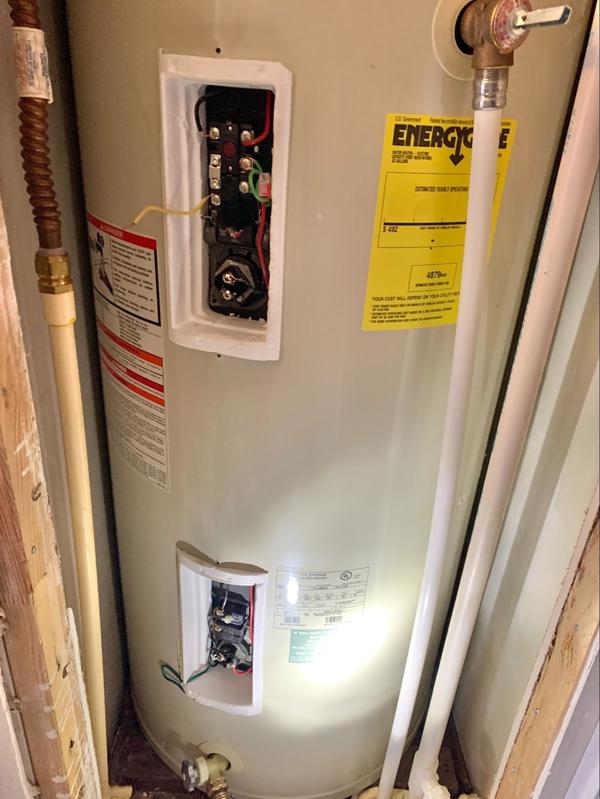
Having a nice, warm shower turn freezing cold is an unpleasant experience. Or maybe you hear concerning odd noises from your water heater or see water puddling around it.
These frustrating water heater issues should not be ignored, as they can indicate serious damage that needs immediate resolution.
In this blog, we’ll explore the causes of these problems in further detail, including what to do or when to contact a professional plumber to help restore your water heater to prime condition.
Need Help With Your Water Heater? Call MSP Today!
Is your water heater leaking, making strange noises, or running out of hot water faster than normal? At MSP, we have over a century of experience delivering high-quality tankless and tank water heater repairs to Twin Cities homeowners.
If you’re looking for an efficient, trustworthy team that provides 100% satisfaction guarantees, don’t hesitate to contact us! For speedy scheduling, call us at (651) 228-9200 for 5-star plumbing service.
The Water Heater Is Leaking
Do you see a suspicious puddle of water around your water heater? You most likely have a system leak. Fixing the leak as soon as possible is important for preventing any water damage to your home.
Water heater leaks primarily come from either the top or bottom of the water heater’s tank. The following problems cause water to come from the top of your water heater:
- A leaky cold water inlet valve
- A loose pipe fitting
- A leaky temperature and pressure relief valve
- A corroded anode rod
- A cracked tank
In contrast, a leak from the bottom of a water heater is due to more extensive issues that are more difficult to fix, and you may need to replace your water heater:
- A leaky drain valve
- A leaky tank
If you suspect that you have a water heater leak, follow these steps:
Turn Off Your Water Heater:
Turn off your gas or electric water heater before you look for and troubleshoot the leak.
- Shut off your gas water heater by turning the gas valve on the unit to the “OFF” position.
- Shut off your electric water by switching its power off at your electrical panel. Look for a two-pole breaker labeled “water heater” and turn it to the “OFF” position. Move the ball valve connected to the water heater to be perpendicular to the piping at a 90° angle.
Look for the Leak:
Depending on whether the water is coming from the tank's top or bottom, you’ll want to look for the leak in different locations.
If the leak comes from the top of the tank, carefully look for water escaping from the cold water inlet valve or loose pipe fittings. Rusted hot and cold water valves can have loose connections with the tank, with water leaking out of them.
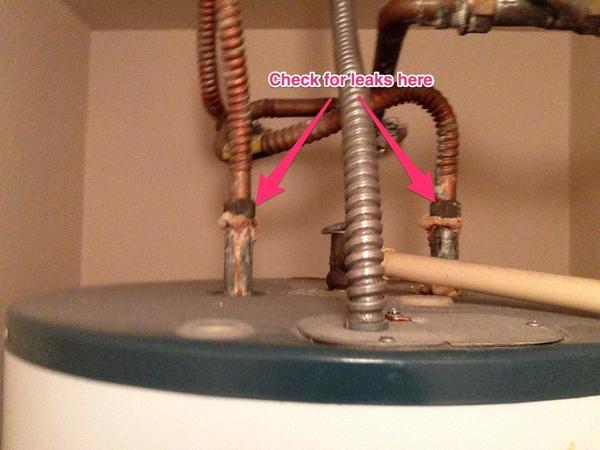
Check that the water heater’s valve connections are not loose.
You’ll also want to check your water heater’s temperature and pressure relief valve for leaks and the anode rod for corrosion. The anode rod absorbs all the corrosive minerals in your water, keeping them away from your water heater’s lining. Once the anode rod can no longer do its job, the lining begins to rust, and the water heater becomes susceptible to leaks.
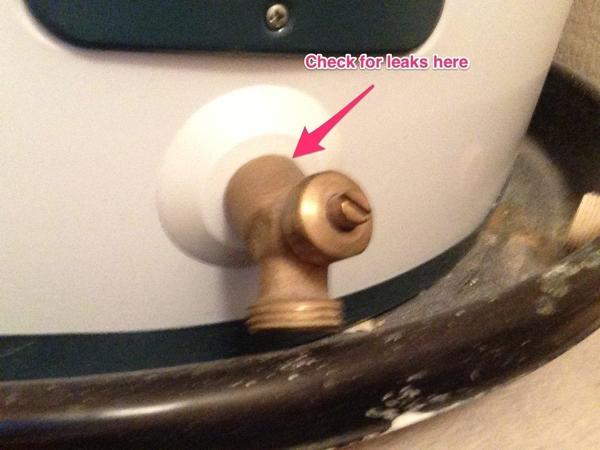
Check the drain valve for leaks.
If the leak comes from the bottom of the tank, carefully check the drain valve and tank itself for leaks. Corrosive elements in your water can rust the water heater from the inside out, leading to water coming out of the tank’s sides. It also indicates that your water heater is at risk of bursting and needs immediate replacement.
Troubleshoot the Leak:
You can use a wrench to:
- Turn the nut on the cold water inlet valve counterclockwise
- Tighten pipe fittings
- Tighten drain valves
Call a Professional Plumber:
You should book a repair appointment if your water heater still leaks despite your troubleshooting. More complex water heater parts require a professional’s assistance, like the below circumstances:
- Replacing a leaky temperature and pressure relief valve
- Replacing a corroded anode rod or pipe fittings because they increase the risk of damaging your water heater
- Replacing a water heater with holes or leaks in its tank, or else you risk the tank bursting and flooding your home
Water Quickly Gets Cold or Takes a Long Time To Heat
Have you recently experienced your shower turning ice cold on you? Or maybe you’ve stood waiting for more than a minute to receive hot water?
Whether your water heater is running out of hot water faster than normal or simply not heating up fast enough, the following reasons can be the cause for your unpleasant showers:
A Broken Dip Tube
Broken dip tubes are the most common reason for hot water not lasting as long as it should. It’s a long plastic tube connecting the cold water inlet to the bottom of the heater, separating cold water from hot water. The hot water is at the top of the water heater’s tank, and the cold water heats up at the bottom before joining the hot water to be sent out throughout your home.
Without a properly functioning dip tube, the water heater will not stay hot for long and produce tepid water. Broken dip tubes can also lead to tiny flecks of plastic in your water supply.
Contact a professional plumber for a dip tube replacement. They will also check your water’s acidity and the dip tube’s material to recommend the type of dip tube that will hold up better in your water heater.
A Faulty Heating Element or Thermostat
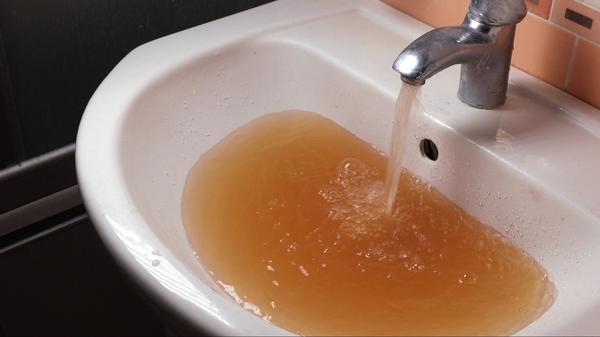
Faulty heating elements can lead to rusty water.
Beyond less hot water, rusty or cloudy water can signify that your water heater has a broken heating element or thermostat. Most electric water heaters have an upper and lower heating element that warms the water until it reaches the desired temperature you set on the thermostat. You may be left with cold water if the heating elements burn out.
A faulty upper element means the water will not reach the temperature set on the thermostat.
A faulty lower element means that hot water runs out faster than usual.
Check your fuse box if you suspect that you may have a faulty thermostat. Power surges affect hot water production, and you can resolve the issue by resetting the box. You can use a digital multimeter or contact a plumber to inspect the heating elements.
An Improperly-Sized Water Heater
Every household will need a different water heater size, and it’s important to have a properly sized water heater that can support your hot water needs. A smaller water heater may be sufficient for one household but not another. Approximately 75% of a water heater tank is for hot water. So, a 40-gallon tank actually has around 30 available gallons.
The available supply can quickly deplete and leave you with cold water if you’re using hot water for multiple appliances (such as your dishwasher, washing machine, and showers). However, this doesn’t apply to tankless water heaters as they operate on demand.
When your water heater is too small for your hot water needs, it may be time to get a replacement. A plumber can help you determine your household's best water heater size by calculating your water usage. As a rule of thumb, a 50 to 60-gallon tank water heater suits a household of 3-4 people. Larger households should consider investing in a tankless water heater for more reliable hot water.
The Tank Has Sediment Buildup

Sediment buildup at the bottom can cause issues.
Water heaters don’t always suddenly turn your water cold. Sometimes, it’s a gradual change where your hot water gets increasingly colder over time due to sediment buildup. Calcium and magnesium minerals in your water supply accumulate and sink to the bottom of your water heater. The buildup blocks the heating element from contacting your water, interfering with the unit’s ability to produce hot water.
You can tell if you have tank sediment buildup when:
- You hear popping noises coming from the tank
- You see rusty water or smell strange odors from the water
- You see leaks near the water heater’s drain valve
Contact a plumber to resolve the issue with a water heater drain and flush tune-up.
The Water Heater Is Too Old

Old water heaters need replacing.
Sometimes there is no specific reason for the water heater to run out of hot water, and it’s simply because the water heater is too old and past its prime of 13-15 years. Once the water heater reaches the end of its lifespan, repairs and replacements are inevitable.
Scheduling yearly maintenance to get your water heater flushed and drained helps extend its lifespan. You can also install a water softener to reduce the tank’s sediment buildup.
The Shower Is Too Far From the Water Heater
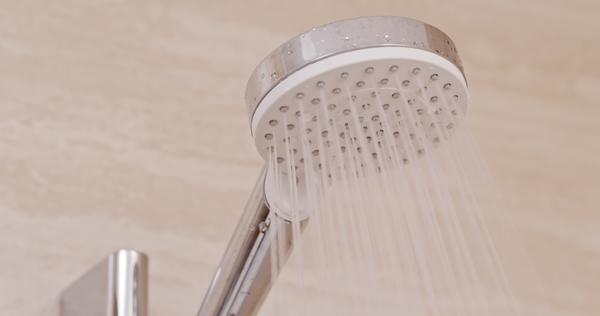
Showers that are too far away from the water heater will take a long time to heat up.
You may have a shower that is too far away from your water heater, which means it’ll take longer for the unit to deliver hot water to your shower. Larger homes can require hot water to travel over 100 feet before it gets to you via water pipes connecting the water heater with various plumbing fixtures. Pipes need to curve to accommodate corners in your home, which means a 50-foot distance can translate to 60-70 feet of piping.
If you have a large home or a shower far away from your water heater, you can install a demand hot water recirculating system. According to EnergyStar, these systems can save you money and energy because they send leftover cold water still sitting in your pipes back to the water heater instead of going down your shower drain. They can even run some hot water intermittently through your pipes to prevent them from getting cold. Because the pipes didn't absorb all the warmth from the heated water, you'll have more hot water for your shower.
The Showerhead’s Flow Rate Is Too Low
Your shower will take longer to heat up if you have a showerhead with a low flow rate. A Gallon Per Minute (GPM) rate measures how many gallons of water can pass through the showerhead in a minute. The lower the flow rate, the longer the showerhead takes to push out any leftover cold water sitting in the water pipe from your last shower.
Most homes have a showerhead with a flow rate of 2.5 GPM or lower. New, high-flow rate showerheads have a GPM of 0.50 or lower. Upgrading to a higher flow rate showerhead can help you get hot water faster.
The Pipes Pull Too Much Heat From the Water
Your water piping material can affect how long it takes for your shower to warm up. The colder and denser the material of your pipes, the more warmth they pull from the hot water passing through and the longer you wait for your shower to heat up.
For example, CPVC pipes do not retain heat as well as heavier copper pipes do. Because CPVC pipes have greater heat loss, they will take longer to deliver hot shower water.
You can install a demand hot water recirculating system that periodically sends hot water through pipes to keep them warm when not in use, especially if you have extensive lengths of piping or the pipes are in an exterior wall with cold ambient temperatures.
The Water Heater Is Making Whistling or Popping Noises
If you hear strange noises from your water heater, they’re most likely whistling or popping. Troubleshooting the root cause depends on which sound you’re hearing.
Before calling a plumber about the noises, turn off your gas or electric water heater and water supply.
- You can turn off a gas water heater by twisting the dial on the top of the thermostat to the “OFF” position and closing the gas shutoff valve on the gas line directly behind the unit.
- If you have an electric water heater, switch the unit’s circuit breaker to the “OFF” position.
- Shut off the water supply by turning your main water shutoff valve (usually located directly above the water heater) clockwise.
Popping Noises From Your Water Heater
Sediment buildup in your water heater's tank usually causes popping sounds. Tiny particles of calcium and magnesium minerals from hard water settle at the bottom of the tank over time, forming tiny air bubbles underneath the sediment. These air bubbles pop as they continually burst. The buildup also leads to higher energy bills as the water heater must work harder to produce enough hot water. A straining water heater can damage its lining due to overheating, causing a tank leak that may damage your home.
If your water heater hasn’t received a flush in a long time or you have particularly hard water, there’s a good chance there’s quite an accumulation of sediment in the tank. All water heaters need regular flushes to prevent significant sediment buildup and remain at peak performance. You can also combat the popping noises by installing a whole-home water softener, reducing your hard water levels and making it easier for your water appliances to process. It’ll also produce gentler water on your skin, clothes, and plumbing pipes.
It’s best to call a plumber as soon as you hear popping noises for a flush and potential water softener installation. Better yet, schedule a yearly flush to avoid sediment buildup and maximize the lifespan of your water heater.
Whistling Noises From Your Water Heater
Whistling sounds can be a signal that there is a problem with your water heater’s internal components. The main challenges include high tank pressure, a loose or leaky drain valve, or a cracked tank.
The temperature and pressure relief (TPR) valve prevents heat and pressure from reaching dangerous levels inside a water heater’s tank. It opens slightly to let air escape the tank, reducing the pressure buildup. As air escapes, it makes a whistling sound. You don’t need to be concerned about whistling sounds if they are rare. But frequent whistling sounds mean your water heater has constant high tank pressure, and you need to immediately contact a plumber to repair the problem.
Like the TPR valve, the drain valve also helps your water heater to release buildup. However, the drain valve empties the tank’s water and any sediment—not pressure. Leaky or loose drain valves allow air to enter the tank and cause whistling sounds. Corroded cold water inlets and hot water outlets can also create whistling sounds. Use a wrench to ensure the drain valve has a tight seal, and contact a plumber to see if the cold water inlet and hot water outlet need replacement.
Like popping noises, a cracked water heater tank can cause whistling noises. A plumber must replace the tank promptly because the part is vital to a water heater's operation.
Put Your Water Heater Concerns To Rest With MSP’s Care
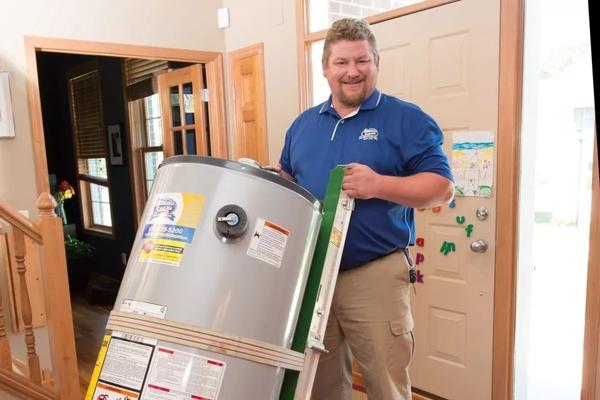
Contact MSP Plumbing Heating Air for your water heater needs.
Since 1918, Twin Cities households have relied on MSP Plumbing Heating Air to resolve their water heater problems on the same day they call. We're known for our commitment to outstanding customer service, whole-home comfort, and honest upfront prices.
Our plumbers have the expertise to repair all brands and models of tank and tankless water heaters in no time. We’ll accurately diagnose the issue and provide comprehensive recommendations for your home and hot water needs. All our repairs come with a 100% satisfaction guarantee.
If you need a water softener, tankless water heater installation, or a tank water heater replacement, we’ll assess the best size for your home so that your showers stay toasty warm. We can also install an on-demand hot water recirculating system or a high flow-rate showerhead. You’ll also have the opportunity to apply for convenient financing options.
With over a thousand 5-star reviews and counting, call us today at (651) 228-9200 for high-quality and affordable water heater services.
